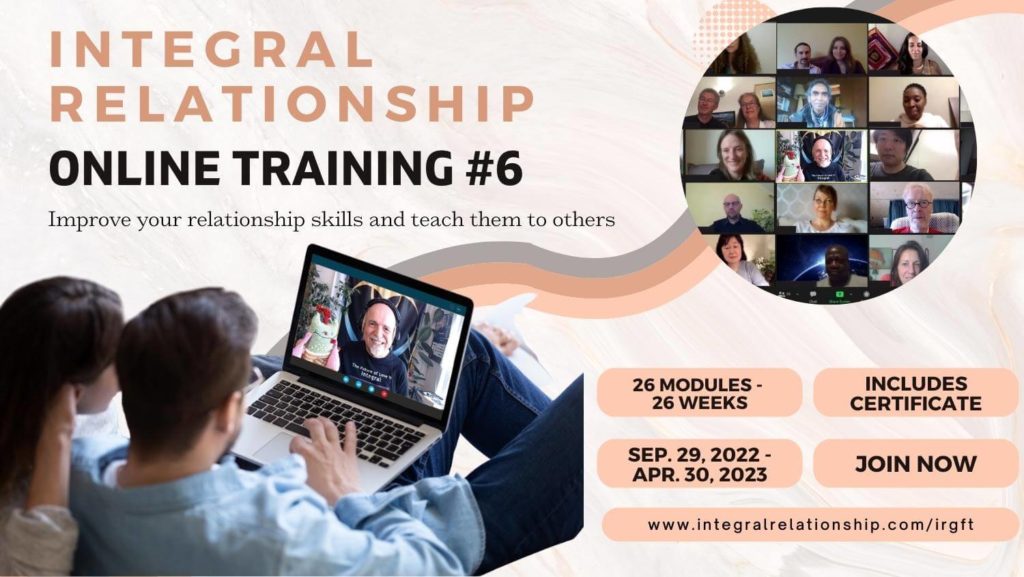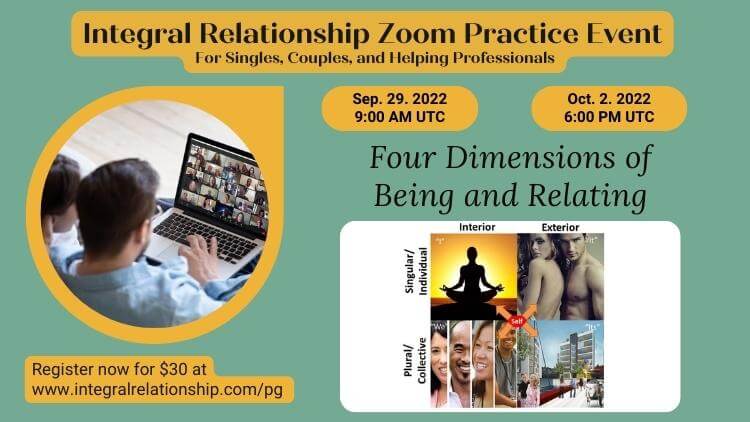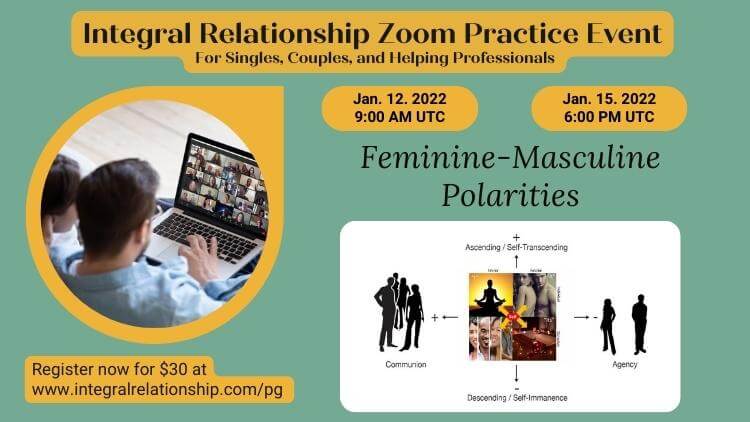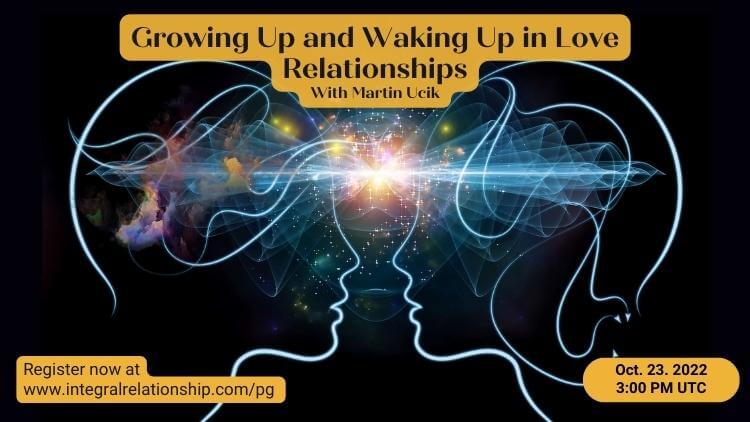Sign Up for Integral Relationship Practitioner Sessions
Zoom Training for Singles, Couples, Helping Professionals, and Group FacilitatorsPrevious Modules Below
Module 1: "Four Dimensions of Being and Relating"
Click here for your local time converter and move the slider to the UTC time above. Register below.
Learn and practice how to build a solid foundation for a healthy sustainable Integral Love Relationship. Realize that four essential dimensions of your human being and relating come into intimate contact with each other when you fall in love and enter a committed romantic relationship, regardless of whether or not you and your partner are consciously aware of them.See how these four dimensions are arranged in four quadrants:
1. Your individual, subjective, interior mind and feelings, represented by the Upper Left quadrant.
2. Your collective, inter-subjective, interior cultural background, values, and communication, represented by the Lower Left quadrant.
3. Your individual, objective, exterior physical body and behavior, represented by the Upper Right quadrant.
4. Your collective, inter-objective, exterior social environment, represented by the Lower Right quadrant.
Understand why it is foundational for any healthy love relationship to integrate, balance, and harmonize these four dimensions.
Notice whether you and your partner are attracted to each other and focused on co-creating in only one or two of these four dimensions/quadrants, while neglecting or ignoring the others, or focused on co-creating in all of them.
Avoid potential relationship conflicts and breakdowns, especially when you focus on relating and co-creating in different dimensions: for example, one of you on the Upper Right physical/sexual and Lower Left cultural, and the other on the Upper Left mental and Lower Right social dimensions.
Experience all four dimensions in an embodied exercise.
Module 2: "Survival, Magic, and Power in Love Relationships"
Book to learn and explore how the archaic, magic, and egocentric stages of consciousness developed in your earlier life and how they impact your love relationships today.
Receive an introduction to cultural and individual developmental stages of consciousness and learn how they evolved through solving the significant problems and limitations of earlier stages.
Learn about the archaic stage that entails biological survival needs, such as food, shelter, physical health, work, sex, and fight-flight-freeze reactions, which are the foundation of all love relationships.
Investigate the second stage, called magic, which entails the magical and mysterious aspects of love relationships and your needs for safety and belonging.
Look at potential narcissistic tendencies between you and your partner that are characterized by childish selfishness, a sense of unrealistic entitlement, a lack of empathy between partners, and pervasive needs for admiration.
Understand how people who are exclusively at this stage of development often feel insecure and victimized, are superstitious, and engage in magical thinking and irrational conspiracy theories.
Investigate the third stage of consciousness development, called egocentric, which entails desires for instant gratification, respect, freedom, narrow boundaries, autonomy, and dominance over others. Understand its impacts on your relationship.
Look at the healthy needs and expressions of each of these three stages, as well as the unhealthy aspects and limited views.
Understand how lack of healthy integration and attachments to limited views at these stages are often the cause of relationship conflicts and breakups, especially when one partner is at a later or earlier stage of development than the other.
Module 3: "Mythic Conformism and Modern Rationality in Love Relationships"
Book to learn and practice how/if the mythic and modern stages of consciousness developed in your life, and how they impact your love relationships today.Gain insights into the fourth stage, which is called mythic or traditional, in which you seek to satisfy your needs for stability, order, purpose, hope, recognition, right and wrong morals, and future rewards for right behavior through establishing law and order, including clearly divided gender roles and rules to which women and men are compelled to conform.
See how these rules and roles are often based in religious and other myths about humans and the world (such as, “Men are from Mars and Women are from Venus”) rather than in rationality.
Investigate the fifth stage, which is called rational or modern, in which you gravitate towards objective reasoning, scientific methods, individual freedoms and responsibilities, and democratic capitalism to satisfy your desires for individual choice. In the fifth stage, you are also focused on pursuing success through taking controlled risks; gaining personal liberty, individuality, equality, rights, self-expression; and seeking the good life through attaining material abundance, higher educations, objective information, a successful career, money, and win-win thinking.
Notice how the focus in love relationships at this level is to augment the couple’s quality of life, social status, and worldly success, and to support each other to reach their individual goals.
Look at the healthy needs and expressions of each of these two stages, as well as the unhealthy aspects and limited views.
Understand how lack of healthy integration and attachments to limited views at these stages are often the cause for relationship conflicts and breakups, especially when one partner is at a later or earlier stage of development than the other.
Module 4: "Postmodern Pluralism in Love Relationships"
Book to learn and practice how/if the pluralistic stage of consciousness developed in your life, and how it impacts your love relationships today.Feel how this stage allows for greater compassion, idealism, and involvement by providing a sense that all human beings—regardless of race, gender, sexual orientation, cultural background, or class—are born equal and should be equally treated, heard, and respected.
Realize how people in this stage reject hierarchy/patriarchy and establish lateral social structures with an emphasis on values such as communion, empathy, peace, compassion, nonviolence, and consensus among all.
Develop a sense that all souls are connected in a web of life.
Develop a deep caring for Mother Earth and all its inhabitants and, along with it, the desire to find peace and happiness within, which triggers an exploration of the feelings and inner experiences of the self and others, with an increasing attention to the unconscious and subjective.
Recognize the potential downside of this worldview, as rationality is dismissed and the feminine is established as being superior to the masculine. This perspective can lead to new-age narcissism and relativism, along with unending discussions in which all parties add divergent observations and feelings without ever achieving consensus and reaching decisions. Such continual, unresolved discussions, despite the best intentions, often make love relationships challenging and unstable.
Look at the healthy needs and expressions of this fascinating stage, as well as the unhealthy aspects and limited views.
Understand how a lack of healthy integration at this stage, as well as attachments to limited views, are often the cause for relationship conflicts and breakups, especially when one partner is at a later or earlier stage of development than the other.
Module 5: "Integral/Transpersonal love relationships"
Book to learn and practice how/if the integral and transpersonal stages of consciousness development emerged in your life, and how they impact your love relationships today.Realize why people at the previous “first-tier” levels of consciousness development insist that their particular views, beliefs, and values are the best and only “right” way to see the world and to make their love relationships work.
Understand why people react negatively and lash out in defense whenever their views are challenged or threatened, using the tools that are available to them.
See why people in “second-tier” integral and transpersonal levels of consciousness intuitively recognize the importance of all preceding levels—including the process of development itself.
Integrate the essential qualities and basic capacities of each preceding level while transcending the limited views through ongoing learning, healing, growing, and awakening.
Balance and harmonize healthy masculine agency/ascending and feminine communion/descending polarities in all four dimensions of your being and relating in order to co-create attraction, synergy, and flow in your love relationships.
Meet others at earlier levels of consciousness development with understanding and compassion, supporting them in their development without getting entangled in their drama, and co-create a love relationship with an equal and opposite partner.
Look at the healthy needs and expressions of each of these two stages, as well as the unhealthy aspects and limited views.
Understand how a lack of healthy integration at these stages, as well as attachments to limited views, are often the cause for relationship conflicts and breakups, especially when one partner is at a later or earlier stage of development than the other.
Module 6: "Compassionate communication"
Book to learn and practice how to communicate your observations and related feelings in a nonviolent and compassionate way in order to get your needs met by your partner.Identify your specific needs when relating with others, especially in your love relationships.
Separate your observations of your partner’s behavior from the feelings that are stimulated in you when your needs are not met.
Express these feelings in an authentic, nonthreatening way by distinguishing them from interpretations and strategies.
Without being attached to an outcome other than compassionate connection and mutual understanding, make doable requests that clearly communicate what and why, when, where, and how you want your partner to meet your needs.
Understand the difference between needs and neediness.
Offer your partner empathy when he or she is in distress by guessing his or her observation, the feeling created, and the unmet need—and then make an offer to reestablish love and connection.
Module 7: "Need-Based communication"
Book to learn and practice how people at the first six levels of consciousness development communicate differently to validate their views and behaviors to get their needs met.Realize that it is generally true that the most important skill to make relationships work is effective communication, but that people who are at different levels of consciousness development often cannot create mutual understanding, have their needs met, and solve their significant relationship conflicts through better communication.
Understand how people at the archaic, magic, egocentric, mythic, rational, and pluralistic stages make different feminine and masculine validity claims as to what is objectively true, subjectively truthful, morally/ethically right, aesthetically beautiful, and functional/practical from their view.
Consider a useful metaphor that likens communicating from different stages to speaking different languages, such as Greek and Chinese, resulting in a lack of communication that leads to irresolvable conflicts.
Practice communicating with others at their level of consciousness development by showing curiosity and empathy so that they feel heard and understood.
Think win-win by focusing on your shared interests and needs; resolving conflicts by agreeing to disagree; or ending contentious conversations or relationships with love and compassion (instead of causing ongoing suffering for yourself and others) when conflicts become irresolvable because of developmental differences.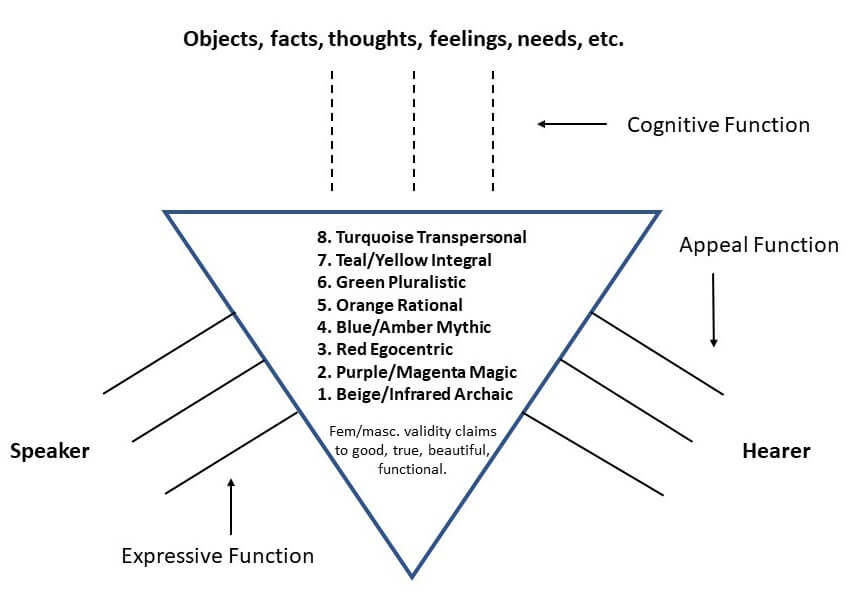
Module 8: "Integral and transpersonal communication"
Book to learn and practice how people at the seventh integral and eighth transpersonal level of consciousness communicate to validate their views and behaviors in order to get their needs met.Realize why everyone is right (but not equally right) from the viewpoint of what is called their “Kosmic Address,” which is defined by the combination of their level of consciousness development or altitude, the perspectives they take from one or more of the four dimensions of being (quadrants), and the feminine/masculine validity claims they make.
See that all views hold partial truths, as nobody is stupid enough to be wrong all of the time or smart enough to be right all of the time.
See how people and groups at the seventh integral level of consciousness development shift from need-based to being-based communication by moving away from the narrow judgments and beliefs of people in the previous six levels towards curiosity and openness about what they consider to be good, true, beautiful, and functional.
See, too, how people and groups at this level validate their own views by referring to what the most competent and peer-reviewed experts in any given field agree on as serving the greatest good or happiness for the largest number of people.
Advance into the eighth transpersonal stage in which a new sense of humility, beginner’s mind, and compassion emerge, and communication becomes more authentic, personal, vulnerable, and dialectical to advance into novelty.
Recognize the shift away from looking and talking down at people in first-tier consciousness from the integral level (which can be perceived as being arrogant and superior) towards a deep caring, love, kindness, and bonding that becomes the hallmark of creating mutual understanding with others and serves the greatest good for all living things.
Module 9: "Biological Differences and Learned Gender Roles"
Book to learn and practice how to understand the opposite sex as never before, by hearing about their deepest secrets, truths, fears, shame, frustrations, desires, hopes, attractions, joys, appreciations, and needs.
Distinguish between biological/natural sex differences, and divergent culturally nurtured and socially conditioned and adopted gender roles of men and women.
Gain a better understanding of your own and the opposite sex by sharing your own experiences and listening to what others share about sex and gender—what is nature, and what is nurture?
See how the perspectives from the four dimensions of being and relating (quadrants) and levels of consciousness development impact individuals’ views on sex and gender, the feminist perspective, and views from gender studies discourse.
Explore questions like the following:
How can we better understand the opposite sex if we have never walked in their shoes (or lived in their bodies)?
Why do these differences exist, and how did they develop? Are we still in our essence (male) hunters and (female) gatherers?
Do different gender roles make sense—and when? Why do we have gender conflicts, and how can we resolve them?
Find answers through open listening, vulnerable sharing, deep understanding, nonjudgmental acceptance, authentic empathy, and caring compassion. Join us in a safe environment for an engaging and eye-opening experiential exploration of these exciting and important topics.
Make peace with yourself and the opposite sex.
Live happily ever after in a healthy love relationship!
Module 10: "Fear-Shame Downward Spiral"
Book to learn and practice how to avoid going down the fear-shame spiral that eventually leads to relationship crash, and how to make amends and return to love if the spiral has already happened for you and your partner.
Realize why approx. 50 percent of relationships end because couples unconsciously descend through the ten phases of the fear-shame spiral.
Avoid the unnecessary emotionally frustrating, financially devastating, socially disruptive, physically harmful, and children-traumatizing ending of relationships by understanding why most women experience fear under relationship stress and why most men experience shame.
Recognize and understand the ten phases of the downward spiral and why they unfold in the order that they do.
Practice how to reverse the path down the spiral by emotionally connecting with your own and your partner’s feelings in order to no longer stimulate fear or shame in each other.
Make amends and return to the romance, love, and intimacy that you experienced at the beginning of your relationship.
Become able to not only make your own love relationship crash-proof but also to support family members, friends, and clients who are going down the spiral in finding their way back to love.
Module 11: "Feminine-Masculine Polarities"
Book to learn and practice how to develop, balance, and harmonize healthy feminine and masculine polarities for the co-creation of sexual attraction and synergy in a healthy, sustainable love relationship.
Define what feminine and masculine means to you.
See how the healthy expressions of both polarities can be equally embodied by males and females and are necessary for maintaining their wholeness and partialness in love relationships through descending, communion, ascending, and agency.
Engage in several embodied exercises, with music and movement, to feel into movement and stillness, leading and following, transcendence and immanence, and autonomy and connection.
Realize your healing and growth potentials around your feminine and masculine polarities for the co-creation of a healthy love relationship.
Do away with the postmodern notion that everything feminine is positive, good, or divine, and everything masculine is negative, bad, or toxic, by realizing that both polarities have healthy and unhealthy expressions.
Module 12: "Spiritual Development"
Book to learn and practice how to identify five states of spiritual experiences or “waking up” through a guided meditation.
Realize how these state experiences are interpreted differently from eight levels of consciousness development or “growing up,” and how they impact your love relationships.
Become inspired to make these temporary state experiences into permanently accessibly state-stages through a daily mindfulness meditation practice.
Explore five states or realms of spiritual awakening or realization, as identified by Eastern wisdom traditions and described by Ken Wilber in his many books.
Strengthen your witnessing self or “subject” during a guided meditation by becoming fully present with “gross” physical objects and your body, your breath, your “subtle” thoughts/mind, and your “causal” mystical pure being, spiritual essence, or soul, before you become one with the “pure witness” or subject that cannot be made into an object, witnessed, or thought and talked about, but only pointed to.
Fully awaken to end your own suffering and the suffering you create for others by freeing yourself from any desire, attachment, delusion, and hatred—even about “enlightenment”—through disidentifying from objects in your consciousness.
Integrate the four state-stages into nondual awareness by avoiding the spiritual bypassing (page 183) of dissociating, repressing, denying, rejecting, or splitting off, and, instead, embracing everything and avoiding nothing in present moment-to-moment awareness, without judgment.
Have one of the most important insights of the Integral (Relationship) model—how the five state-stages of “waking up” are interpreted differently from each of the eight stages of consciousness development or “growing up”—in order to understand why we may deeply resonate and fall in love with a partner on a spiritual level, but struggle to co-create a healthy love relationship because of differing needs, values, concerns, and worldviews, and because of spiritual bypassing.
See how you can further grow and awaken in the four dimensions of your being in an Integral Love Relationship with an equal and opposite partner.
Module 13: "Sexual Development"
Book to learn and practice how to identify five state-stages of sexual development, ranging from repressed to sacred/tantric/transcendent.
Understand why it is vital for thriving love relationships that couples move towards the fourth “making love” stage—in which sexuality becomes an expression of their vitality, deep care, and heart connection—and on to stage five of sacred sexuality.
Agree with your partner to reserve regular and ample time for your lovemaking in order to create a warm and intimate environment and to practice how to get each other “in the mood.”
Engage in ongoing learning about your own and your partner’s sexual preferences and desires; expand your sexual boundaries in healthy ways; heal emotional wounds and trauma; transcend fears and shame around your sexuality; and keep advancing your love life to keep it vital and exciting.
Advance to stage five, in which sexuality becomes a part of your spiritual practice and deep soul connection with your partner.
Practice how to become fully embodied and present with each other through ecstatic dancing to different rhythms (soul motion or 5Rhythms); shared meditation; prolonged eye gazing; breathing together into your seven chakras; chanting and praying together; giving and receiving tantric massages; making love with eyes open in the lotus position; and moving kundalini energy up your spine.
Join us for an intimate partner meditation, sensual unconditional touch, and a verbal exploration of the five state-stages of sexual development through questions and answers.
Identify the state-stage of your own and your partner’s sexual development and realize your sexual learning, healing, growing, and awakening potentials.
Module 14: "Anima Animus Complex Development"
Book to learn and practice how to identify five possible stages of the animus complex development in females and five possible stages of anima complex development in males, and how they profoundly impact their love relationships.
Take a deep dive into your early childhood memories through a visual exercise.
Realize how your gender and relationship with your mother and father caused you to repress certain traits of the opposite sex into your unconscious.
See how you now unconsciously project the shadow that was created onto the opposite sex in various ways.
Heal and grow to overcome this complex to co-create a healthy sustainable Integral Love Relationship with an equal and opposite partner at stage three of five stages.
Module 15: "Love Languages"
Book to learn and practice how to improve your dates and love relationships by becoming aware of personality types in general and The Five Love Languages in particular.
Identify in which of five ways you and your partner naturally tend to show and receive love and appreciation.
Participate in a simple test that will reveal the answer.
Learn about each love language and people’s different favorite expressions in a group exercise.
Create a list of how you like to give and receive love and exchange it with your partner.
Contemplate if you’d rather be with a partner who shares your primary and secondary love languages, or if you prefer to be with someone who complements your love languages so that you can create synergy, expand your horizon, and spice up your relationship, or if it does not matter to you one way or the other.
Send the test to your dates before you meet and gain valuable insights.
Engage in great conversations about the love languages that go deeper than just talking about the weather or how your day was.
Create a list with 30 or more acts that make you feel loved if you become or are a couple and share it with each other.
Develop a habit of doing one or more things from each other’s list every day.
Become creative once you have a better understanding of what makes your partner feel loved, and surprise him or her with your own ideas.
Realize that The Five Love Languages are relevant not only for couples, but also for children, family members, friends, and coworkers, and deepen your connection with them by learning about their preferences and what makes them feel loved and cared for as well.
Module 16: "Enneagram Types"
Book to learn and practice how to identify which of the nine Enneagram types you and your partner resonate with most.
Feel into your “wings”—the type(s) next to the primary type that you identify with—and the types you move towards under stress and when you relax.
Understand how your type combinations positively and negatively impact your love relationship by comparing them online.
Put your type in the context of the unhealthy, average, and healthy levels of expression.
Explore how to communicate your own values and needs and how to meet those of your partner.
Identify whether you and your partner resonate most with the self-preservation, social, or attraction/intensity/sexual instinctual variant, and why compatibility, or at least acceptance, are crucial for you to meet each other’s needs.
Co-create a rewarding and thriving love relationship by creating synergy between your Enneagram types.
Registration form
Module 17: "Attachment Styles"
Book to learn and practice how to identify your and your partner’s attachment style through a test and conversation about how you feel about intimate relationships and react under relationship stress.
Gain a deeper understanding of the four attachment styles that are formed in early childhood and remain with you into your adult life: secure, anxious, avoidant, and anxious-avoidant (also called disorganized, disoriented, or ambivalent).
Explore how your genetic predisposition and your relationship with your parents and other caregivers formed your attachment style.
Realize that you can heal your relationship wounds only in intimate love relationships, ideally with a partner who is more secure than you are.
Move towards earned secure autonomous attachment by creating a coherent narrative that supports you in removing psychological blocks and healing childhood wounds that limit you emotionally in your capacity to form a healthy sustainable love relationship.
Support others in learning about their attachment style and becoming more secure.
Module 18: "The Unconscious"
Book to learn and practice how to become emotionally available and deepen your love relationship by taking full responsibility for your primary emotional fight, flight, or freeze reactions to your partner’s reality, instead of projecting them outward onto him or her through blaming.
Separate your observations and perceptions from your emotional reactions.
Realize that your partner is not “creating” painful emotions and feelings in you, but rather “stimulates” or “triggers” already present unconscious psychological wounds and trauma in you.
Create a space between these triggers and your response, instead of reacting from your wounded self.
Get in touch with underlying vulnerable and painful feelings that are protected by your primary emotional reactions.
Integrate your feelings by differentiating and (re-)owning them (I have feelings, but I am not my feelings) instead of dissociating, repressing, denying, ignoring, or splitting them off.
Re-enter the communication with your partner in a sensible and vulnerable way that is not defended by your unconscious wounds, trauma, and unrealized potentials once you feel calmer and more in tune with yourself, instead of fighting and separating.
Enjoy the benefits of this “undefended love” approach that leads to increasing peace, joy, aliveness, vulnerability, compassion, intimacy, and connection in all your relationships.
Become ready for the deep healing process, in practice Module 19, through facing your false beliefs and deepest fears and recognizing your true identity.
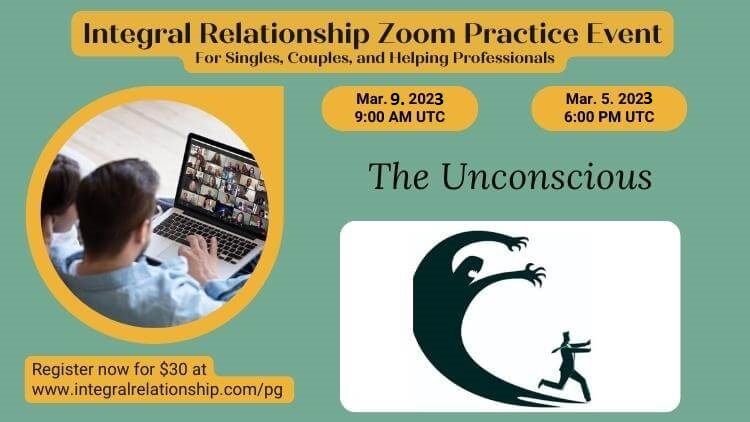
Registration form
Module 19: "Healing our Shadow"
Book to learn and practice how to transform your relationship conflicts into opportunities for ongoing learning, healing, growing, awakening.
Discover your true identity or essence through a simple, yet profound, six-step process.
Take full responsibility for your primary emotional reactions to your partner’s reality instead of becoming defensive.
Get in touch with the underlying vulnerable feelings that are protected by your primary emotional reactions and make them conscious.
Realize the false beliefs about yourself that are hidden below your vulnerable feelings.
Face your deepest fears. State your false identity.
Receive an affirmation and additional information about your true identity.
Heal your emotional wounds and psychological trauma by becoming fully present and by changing the ways you think about yourself and behave.
Stop feeling responsible for your partner’s emotional reactions to your reality, and instead meet him or her with love, compassion, and understanding in mutuality.
Move towards ever-deepening intimacy, passion, and commitment by being less defensive.
Feel, all of the time, the way you felt when you first fell in love.
Enjoy an undefended love relationship.
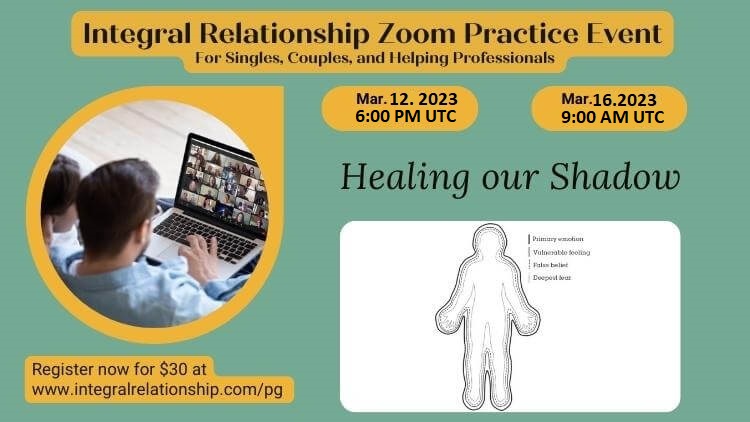
Registration form
Module 20: "Forms, Levels and States of Love"
Book to learn and practice how to fall in love with someone good for you, and you for him or her, by understanding eight forms of love, six levels of dependence, and five states or phases of love.
Realize that the eight forms of love are experienced through a combination of three essential ingredients:
(1) various levels of “interior” intimacy (into-me-you-see) which are determined by the level of consciousness, and spiritual and emotional development of each partner;
(2) various degrees of “exterior” passion, which are created through hormones when your primary sexual fantasies are met;
(3) various degrees of dependence, ranging from unhealthy co-dependence to healthier forms of dependence, independence, and interbeing, to inter-becoming at higher levels of spiritual realizations and shared purpose.
See that when you draw lines to represent the degrees of intimacy, passion, and dependence that you and your partner experience, you can form three metaphorical triangles of love for each of you—one for the reality, one for the projected ideals, and one for your intentions in the relationship.
Successfully navigate the various states or phases of falling in love that are driven by “love” hormones.
Understand that individuals can be in different phases and experience them in different durations and intensities as they get to know each other and become increasingly intimate, passionate, and committed.
Co-create a lasting, healthy, and happy love relationship through understanding the form, dependence, and phase of love that you and your date or partner are in.
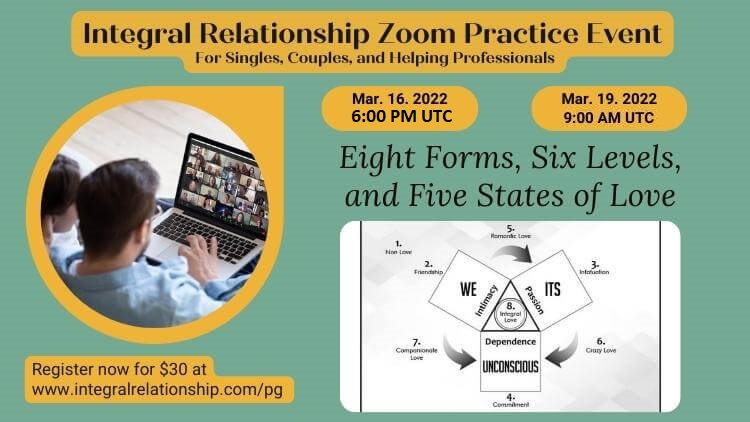
Registration form
Module 21: "Personality Disorders"
Book to learn and practice how not to fall in love with someone who is bad for you, and you for him or her, unless you want to.
Identify possible symptoms of personality disorders.
Choose how to respond to people who display symptoms, especially in love relationships.
Distinguish between challenging “negative” emotional reactions that all couples experience in their love relationships from time to time and the erratic behaviors of people with more serious personality disorders and other pathologies.
Understand that the former are caused when old wounds are triggered and can be usually healed through therapeutic work.
Realize that the latter are marked by patterns of ongoing instability of moods, self-image, and behavior that usually cannot be addressed through therapy and result in impulsive actions and unstable relationships.
Accept that symptoms of personality disorders tend to worsen over time and are often defended by the afflicted individuals as being normal and appropriate, even though the expression of those symptoms have affected their day-to-day life, and especially their intimate love relationships, in negative and often devastating ways for many years.
Learn how to identify the three most common personality disorders.
Avoid the pattern of the “22 stages of decline” that relationships between highly conscious empaths who are in love with afflicted partners usually descend through.
Prevent yourself from falling in love with people who have personality disorders (unless you want to, which can be quite exciting and transformational), and learn how to support them in managing their challenges by showing compassion while maintaining healthy boundaries.
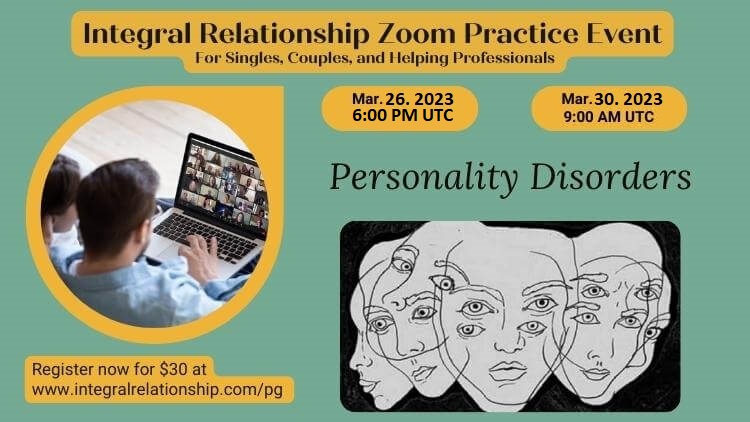
Registration form
Module 22: "Sharing Biological Purpose"
Book to learn and practice how to identify and share your biological purpose and transformational purpose in a healthy love relationship.
Reveal your belief in creationism, evolutionary theory, intelligent design, or a co-creative life force that fundamentally shapes your views on your life’s purpose, and the importance of love relationships and procreation.
Share your experiences and needs around your biological purpose or imperative of survival, procreation, group-forming, territorialism, competition and cooperation, and quality-of-life-seeking.
Realize how the unique ways of living your biological purpose lead to what you desire in a partner and the formation of transactional, asymmetrical, need-based love relationships.
Gain insights about the dialectic of love between the first and second, third and fourth, and fifth and sixth chakras.
Avoid getting into master-slave dynamics in your love relationships.
See how advancing into living and sharing your transformational purpose of learning, healing, growing, and awakening with an equal and opposite partner leads to being-based transformational love relationships along the seven chakras and understand how these relationships typically unfold.
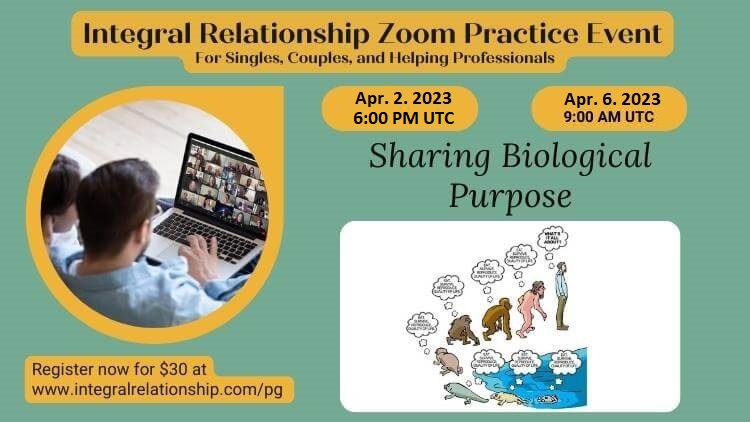
Registration form
Module 23: "Transcendental Purpose''
Book to learn and practice how to awaken to, identify, live, and share your transcendental purpose that goes beyond your biological and transformational purpose.
Reap the physical and psychological benefits from living your transformational purpose, such as increased lifespan, meaning, contentment, and love.
Remove psychological blocks that may prevent you from awakening to, identifying, living, and sharing your transcendental purpose.
Align yourself with your natural talents for empathy, intelligence, creativity, or kinesthetic abilities.
Understand how these talents became genetically encoded through the female sexual selection process of our ancestors and handed down to you through the process of meiosis.
See how your physical and skill development formed the potentials for expressing your natural talents.
Use one or more of the five discovery methods that resonate most with you to identify or clarify your transcendental purpose.
Recognize the depth of expression, level of calling, and stage of maturity of living and sharing your transcendental purpose.
Focus your passion and skills where you can have the greatest impact to make the world a better place.
Combine your strengths for creating more goodness, truth, beauty, and functioning with your soulmate who shares your transcendental purpose in an inter-becoming- based transcendental love relationship.
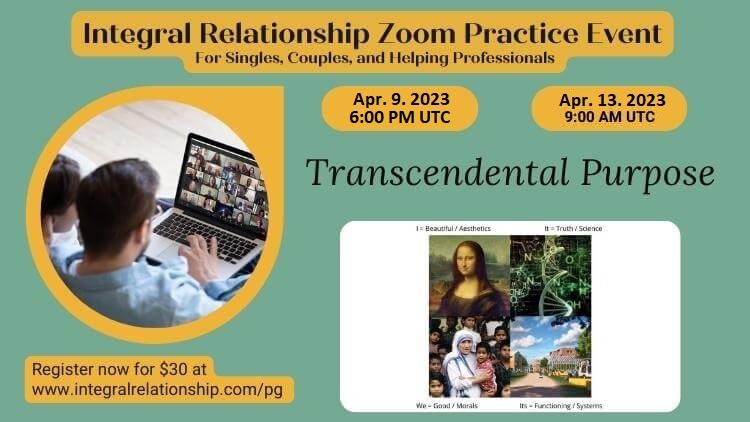
Registration form
Module 24: "Soulmates"
Book to learn and practice how to define, identify, and find or attract your soulmate.
Connect with your soul’s deepest desires and yearnings for a mate to co-create on the biological, transformational, and transcendental level of your being.
Remove psychological blocks and other barriers to love.
Create your personal soulmate profile and dating strategy that allows you to chart your individual path that fits your personality to find, attract, or invite your soulmate.
Realize that even if you don’t meet your soulmate, taking the path towards him or her will immeasurably benefit you, others, and the world in whatever you do.
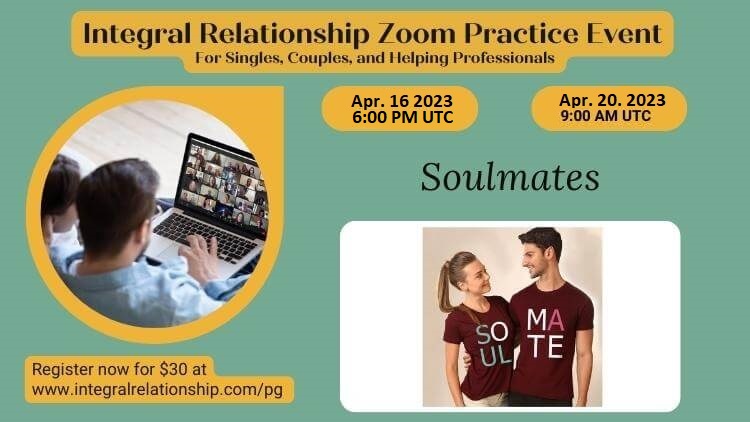
Registration form
Module 25: "Co-Creation at the Seven Chakras"
Book to learn and practice how to co-create a healthy sustainable Integral Love Relationship with your soulmate at the level of your seven chakras.
Engage in a meditative breathing and movement exercise that allows you to feel into the co-creative life force of each of the seven chakras in your body.
Notice the charge in each for your seven chakras.
Heal any unconscious wounds, trauma, or unrealized potentials that block, disconnect, or limit the co-creative life force from manifesting through each of your seven chakras.
Feel into the yearning in each of your seven chakras to co-create with your soulmate in the four dimensions of your being by balancing and harmonizing healthy feminine and masculine polarities.
Bring all the essential elements/dimensions of the Integral Relationship model into a functional whole.
Transform your relationships from need-based, asymmetric, transactional love to becoming-based, symmetric, transcendental love in which you not only love your partner but, even more, that which is uniquely co-created between the two of you at the level of each chakra by sharing your biological, transformational, and transcendental purpose.
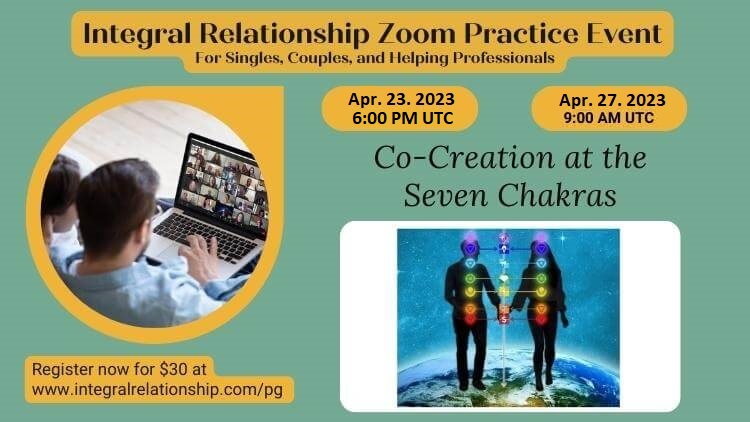
Registration form
Module 26: "Why Relationships Matter and Health Path"
Book to learn and realize why being in a healthy sustainable Integral Love Relationship not only matters for your own well-being and flourishing, but also for that of your soulmate, humanity, and future generations.
Recognize that all functional systems are created by wholes who are parts of larger wholes, like whole humans who are parts of healthy couples, who are parts of functional families, who are parts of thriving communities, who are parts of successful societies/nations, who are parts of a peaceful and sustainable world and future of humanity.
See why we can only practice our simultaneous wholeness and partialness at all levels of our being in a healthy love relationship.
Realize how the increasing number of singles around the world who are unable or unwilling to form healthy love relationships, and the resulting rapidly declining birthrates in modern and postmodern societies, are the underlying cause for the erosion of human bonds and social order, increasingly dysfunctional economic and political systems, environmental destruction, and civil and national wars.
Become part of the solution instead of part of the problem by charting your personal path to relationship success, no matter if you are single or with a partner, and to teach it to others.
Engage in an exercise how to co-create a healthy Integral Soulmate Relationship (see image below.)
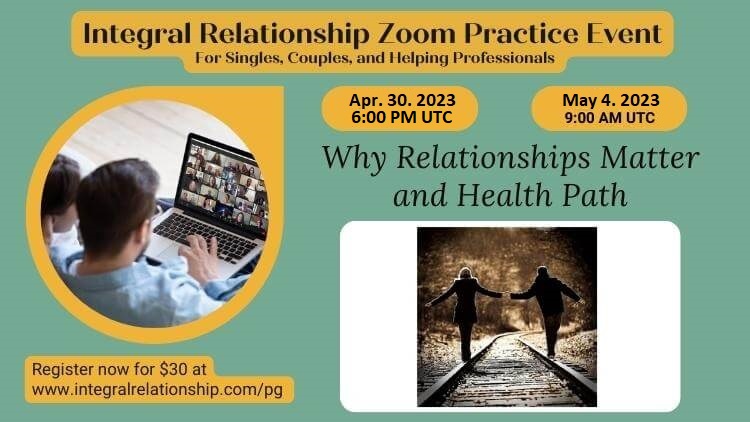
Registration form
Previous Events
Video "Growing Up and Waking Up in Love Relationships" Sunday, Oct. 23. 3:00 PM UTC
Watch the Video Here
Only in intimate love relationships can we prove the depth and embodiment of the transcendence of our ego…
This week at Manifest Nirvana, we are delighted to welcome Martin Ucik, founder of Integral Relationship and author of Integral Relationship Practice and Sex Purpose Love. In this special guest session, Martin shares his unique approach to awakening through and within intimate loving relationships.
Most spiritual and integral approaches to awakening and personal development focus on healing our fragmented selves and transcending our ego so that we can become whole and one with everything.
These approaches to growing up, cleaning up, and waking up often overlook that to become fully human we not only need to move towards wholeness, but simultaneously towards partialness of the ever expanding dimensions of our cultural and social environment.
We do this by realizing that the world lives in us as much as we live in it, and that we come out of it as much as we come into it.
Failing to develop and integrate our simultaneous wholeness and partialness leads to uneven individual development and eventually to the collapse of our communities and societies which provide us with the foundation for our livelihood and well-being.
The solution is found by growing up and waking up in love relationships.
- Only in intimate love relationships can we practice the transcendence of our limited views and inclusion of our healthy capacities at each level of consciousness development (growing up).
- Only in intimate love relationships can we heal the psychological wounds and trauma (cleaning up) at each level of consciousness development by realizing that we can only heal our relationship wounds in relationships.
- Only in intimate love relationship can we balance and harmonize healthy feminine and masculine polarities in all four dimensions of our being along the seven chakras.
- Only in intimate love relationships can we prove the depth and embodiment of the transcendence of our ego’s desires, attachments, hatreds, and delusions at the gross, subtle, causal, and pure witness state/stage and avoid spiritually bypassing.
Join Martin to learn and practice how to co-create an intimate love relationship with an equal and opposite soulmate with whom you can learn, heal, grow, and awaken to make the world a better place by sharing a purpose that creates more goodness, truth, beauty, and functioning.
Watch the Video Here
Sunday, Sep. 18, 6:00 PM UTC – Online Practice Group “Living Tantra in Integral Relationships - with Special Guest Jan Day”
Learn and practice how to identify five state-stages of sexual development, ranging from repressed to sacred/tantric/transcendent.
Understand why it is vital for thriving love relationships that couples move towards the fourth “making love” stage—in which sexuality becomes an expression of their vitality, deep care, and heart connection—and on to stage five of sacred sexuality.
Agree with your partner to reserve regular and ample time for your lovemaking in order to create a warm and intimate environment and to practice how to get each other “in the mood.”
Engage in ongoing learning about your own and your partner’s sexual preferences and desires; expand your sexual boundaries in healthy ways; heal emotional wounds and trauma; transcend fears and shame around your sexuality; and keep advancing your love life to keep it vital and exciting.
Advance to stage five, in which sexuality becomes a part of your spiritual practice and deep soul connection with your partner.
Practice how to become fully embodied and present with each other through ecstatic dancing to different rhythms (soul motion or 5Rhythms); shared meditation; prolonged eye gazing; breathing together into your seven chakras; chanting and praying together; giving and receiving tantric massages; making love with eyes open in the lotus position; and moving kundalini energy up your spine.
Identify the state-stage of your own and your partner’s sexual development and realize your sexual learning, healing, growing, and awakening potentials.
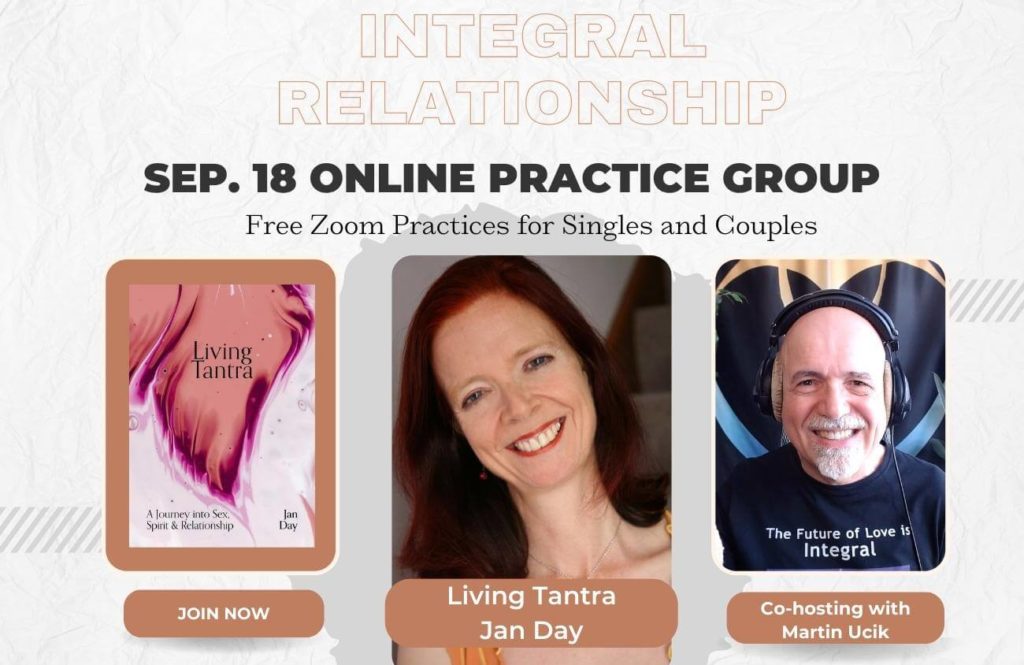
Tuesday, Sep. 27. 6:00 PM UTC "Integral Relationships and NARM" Video
Watch the Video of this special practice event about integrating exercises from his new book Integral Relationship Practice and the final upcoming IR training with the five shame and pride based survival styles from the new NeuroAffective [sic] Relational Model (NARM) book The Practical Guide For Healing Developmental Trauma, by Laurence Heller and Brad J. Kammer:
NARM is the perfect complement for Martin’s work, as it supports us in healing past developmental trauma that often prevents us from co-creating healthy Integral Love Relationships in the present and future.
In fact, he is so excited about NARM that he is training as a NARM Informed Consultant to integrate the model into his final 26 Week Integral Relationship Practitioner Training that starts on Thursday, Sep. 29, 9:00 AM UTC and Sunday, Oct. 2, 6:00 PM UTC with Module 1.
NARM has five organizing developmental themes that Martin already integrated into his new book Integral Relationship Practice:
1. Connection: We feel that we belong in the world. We are in touch with our body and our emotions and capable of consistent connection with others.
2. Attunement: Our ability to know what we need and to recognize, reach out for, and take in the abundance that life offers.
3. Trust: We have an inherent trust in ourselves and others. We feel safe enough to allow a healthy interdependence with others.
4. Autonomy: We are able to say no and set limits with others. We speak our mind without guilt or fear.
5. Love-Sexuality: Our heart is open and we are able to integrate a loving relationship with a vital sexuality.
To the degree that these five basic needs are met, we experience harmony in our love relationships.
To the degree that these basic needs are not met, we develop shame and pride based survival styles to try to manage the disconnection and dysregulation.
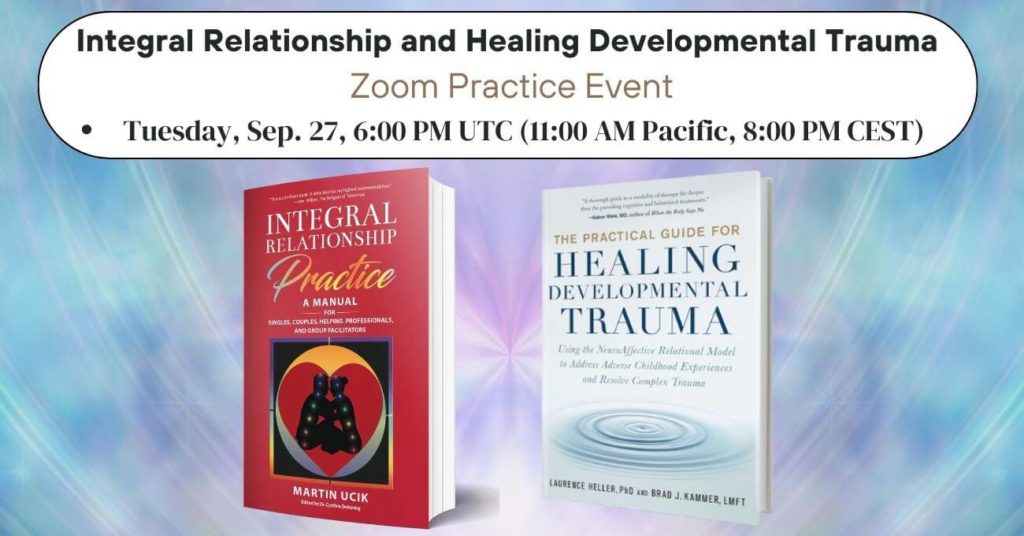
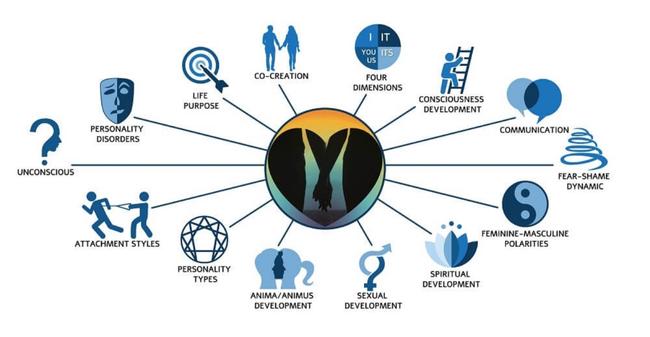
Sunday, Sep. 11, 6:00 PM UTC – Online Practice Group “Enneagram in Integral Relationships - with Special Guest Dr. Khaled ElSerbini” Video
Sunday, Sep. 11, 6:00 PM UTC – Online Practice Group “Enneagram in Integral Relationships – with Special Guest Dr. Khaled ElSerbini” Video
Learn and practice how to identify which of the nine Enneagram types you and your partner resonate with most.
Feel into your “wings”—the type(s) next to the primary type that you identify with—and the types you move towards under stress and when you relax.
Understand how your type combinations positively and negatively impact your love relationship by comparing them online.
Put your type in the context of the unhealthy, average, and healthy levels of expression.
Explore how to communicate your own values and needs and how to meet those of your partner.
Identify whether you and your partner resonate most with the self-preservation, social, or attraction/intensity/sexual instinctual variant, and why compatibility, or at least acceptance, are crucial for you to meet each other’s needs.
Co-create a rewarding and thriving love relationship by creating synergy between your Enneagram types.
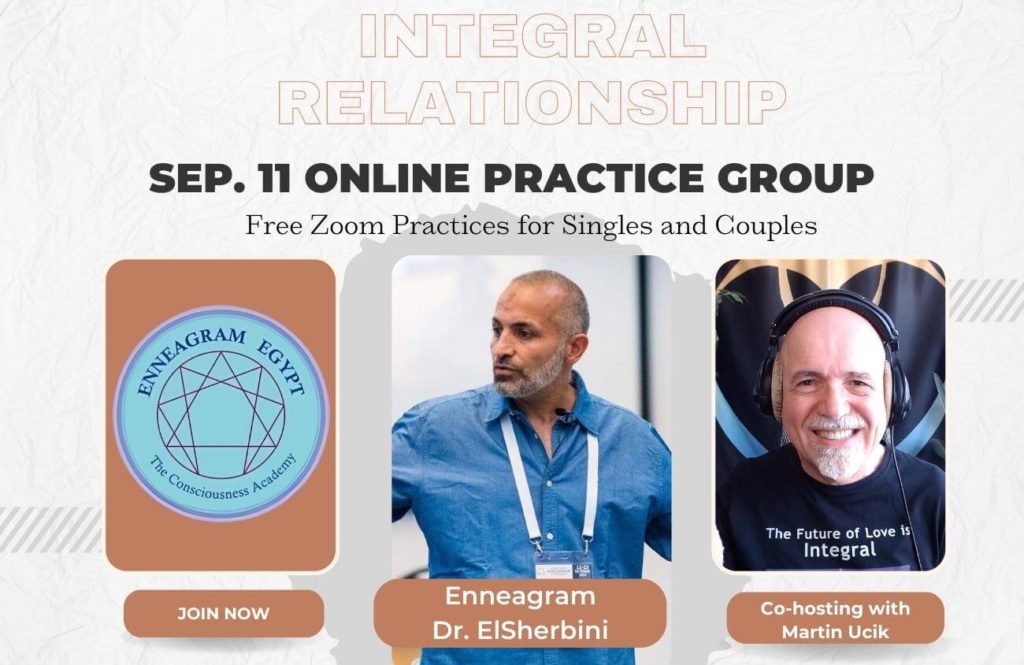
Thursday Sep. 8, 4:30 PM UTC – Online Discussion "Cultural Differences in Consciousness Development" with Martin and Special Guest Dr. Khaled ElSerbini” Video
Thursday Sep. 8, 4:30 PM UTC – Online Discussion “Cultural Differences in Consciousness Development” with Martin and Special Guest Dr. Khaled ElSerbini” Video
During a travel retreat last December in Egypt with 30 national and international students of Dr. Khaled ElSherbini and his wife Natasha to which they invited me, a discussion about integration and embodiment of post-modern Green and higher developmental stages emerged that deeply impacted me.
Until then, I had never grasped the cultural differences in the understanding and embodiment of the Integral Model.
On my final morning in Egypt, I briefly discussed this topic with Dr. Khaled and we became so immersed that I almost missed leaving for the Airport.
Dr. Khaled is visiting me this week in Istanbul to continue our exploration and we invite you to join us on Zoom and welcome your insights, experiences, and questions.
Image Above: Cultural Differences in Consciousness Development
We will explore:
• What effect did the importing of Western technology and values have on emerging societies?
• Is an authentic, organic, and unique emergence of modern and higher stages in emerging societies possible and how does it look?
• To what extent is understanding and experience necessary (and possible) for knowledge and embodiment of an emerging developmental stage?
• Is there a difference in transcending and including/excluding of basic healthy capacities and limited views of previous stages in different cultures?
• How does all of this affect the formation (or disintegration) of love relationships and thus families, communities, and societies?
*Dr. Khaled ElSherbini is the founder and chairman of “Enneagram Egypt,” the first and largest IEA accredited Enneagram school in North Africa and the Middle East.
He is also the founder of The Consciousness Academy, which focuses on human development and spiritual transformation.
Dr. ElSherbini has over 25 years of experience in the fields of human development, coaching, consciousness and awareness, executive management, corporate restructuring, sustainability, renewable energy, research and development, technology management, strategic management, and teaching in the USA, Spain, Ukraine, Germany, Switzerland, China, and in Egypt.
Dr. ElSherbini created models of human consciousness evolution and development by synthesizing and integrating numerous models, mainly: the Enneagram, Spiral Dynamics, Integral consciousness, modern psychological studies, and Sufi spiritual philosophies and psychology.
Dr. ElSherbini is an IEA Accredited Enneagram Professional and the founder of the 3 IEA Accredited Training programs provided by Enneagram Egypt.
He is also a Spiral Dynamics Integral accredited professional by the SDi founder Don Beck through ValueMatch.
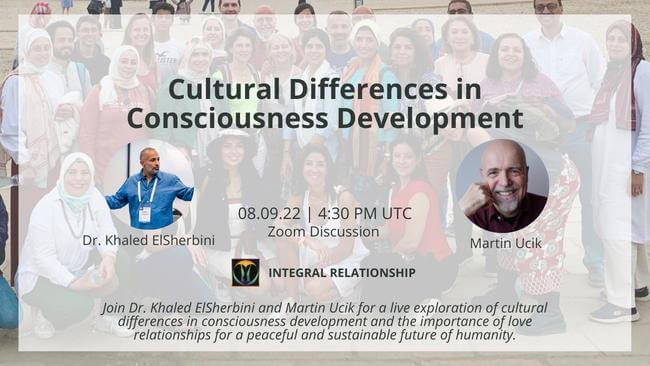
Sunday, Sep. 4, 6:00 PM UTC – Online Practice Group “Forgiveness in Integral Relationships - with Special Guest Barbara J. Hunt” Video
Sunday, Sep. 4, 6:00 PM UTC – Online Practice Group “Forgiveness in Integral Relationships – with Special Guest Barbara J. Hunt” Video
Forgiveness is an essential aspect of Integral Relationships. Join Barbara J. Hunt, author of Forgiveness Made Easy and me for an Integral perspective on Forgiveness and her 7-Step process that is VERY briefly outlined below:
Step One: Eye to Eye
Close your eyes and allow yourself to imagine you are sitting beside a fire and invite the person you wish to forgive to join you at the fireside.
Step Two: Heart to Heart
Maintaining eye contact with the person, allow yourself to say everything that needs to be said to that person.
Step Three: Shoe to Shoe
In your imagination, switch positions with that person. If you can, put on their shoes and stand or sit as they would, then speak back as them.
Step Four: The Balcony
Let the conversation continue between you, but from a very high, wise, compassionate, authentic, “integral” or higher perspective.
Step Five: The Haggling
In your imagination, tell the other person all of your payoffs and the costs of holding onto your resentment and what you’ve got out of resenting them.
Step Six: The Forgiveness
When you’re ready, say some significant words that express your forgiveness.
Step Seven: Completion
Set a new intention for your relationship with this person, especially if you are still in relationship with them; for example, tell them, “From now on how I choose to treat you is…..”
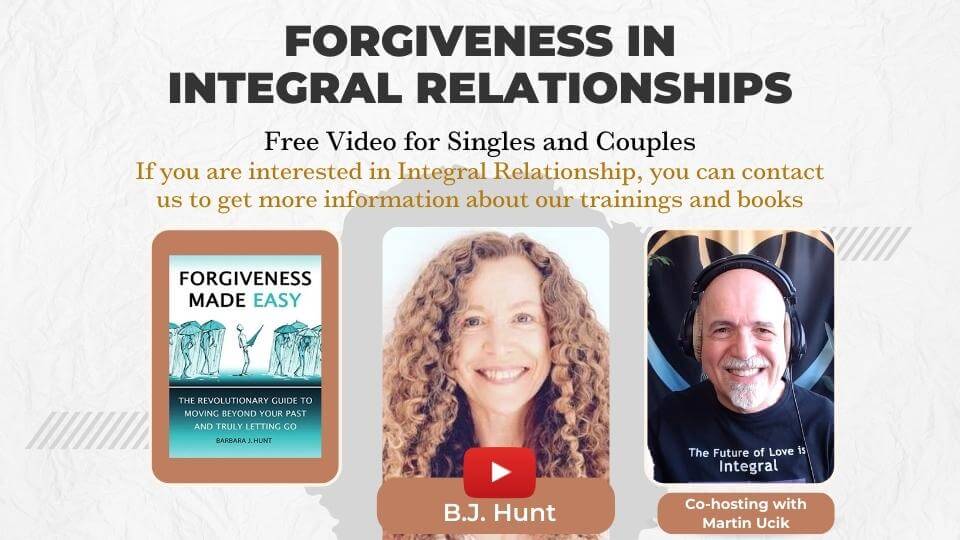
Sunday, August 28, 6:00 PM UTC "Wholeness and Partialness" Video
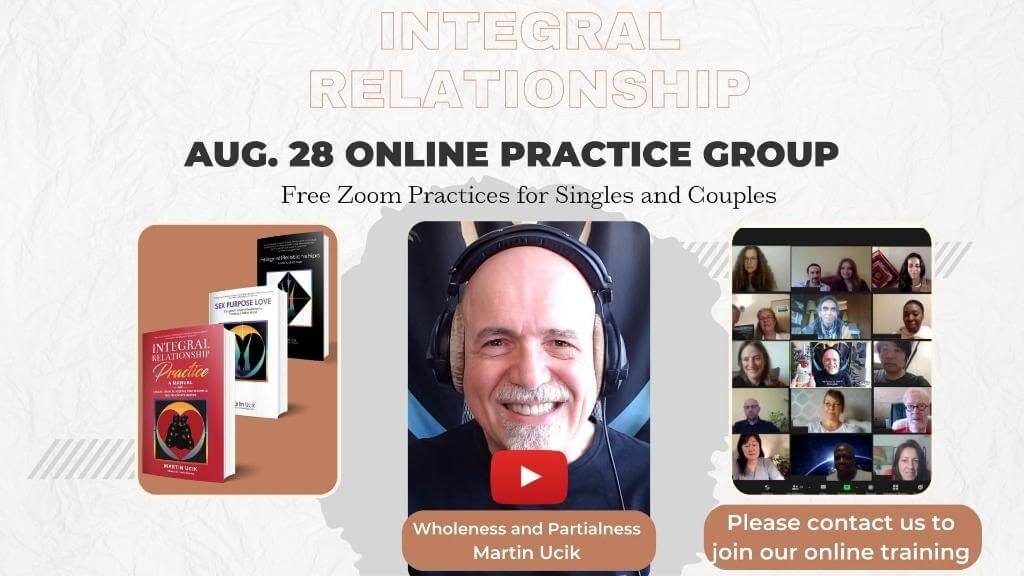
How can I reconcile closeness and dependence with individuality and independence?
We humans, like all beings and objects, are simultaneously whole in ourselves and part of our social environment (as shown below), as nobody can completely survive on their own.
This simultaneous wholeness and partialness on all levels (chakras) of our human being can only be co-created in intimate love relationships
This co-creation is accomplished through balancing and harmonizing feminine and masculine polarities of ascending, descending, agency, and communion that can be embodied by every human being in healthy and unhealthy forms.
When we look at the stages of consciousness development, we find that they oscillate between an inner need to control the outside world (masculine) and to surrender to it (feminine). The further one develops, the more healthy and less extreme the expressions of the fem./masc. polarities become.
In addition to this dynamic or wholeness and partialness is the animus complex in women and the anima complex in men that is projected onto intimate partners. This complex is related to the secure, anxious, avoidant, and anxious/avoidant attachment styles. The more this complex and the attachment fears are healed, the easier it is for us to balance being simultaneously whole and part in our love relationships, and thereby realizing our full human potentials.
The awareness of these connections and the continuous learning, healing, growing, and awakening in intimate relationships is the key to how both (or more) partners can achieve simultaneous connectedness and independence or being part and whole.
To use a metaphor; to reach a destination (healthy relationship) it is most effective to go in a straight line. If we veer too much to the left, we need to correct towards the right and vice versa. The same is true for being whole and part; when we move too much towards wholeness, we need to become more partial and vice versa.
Support Integral Relationship
Do you appreciate Martin’s work and want to make a financial contribution? Any amount, small or large will support him and his team to produce more inspiring and helpful content and make the world a better place. Thank you very much!

